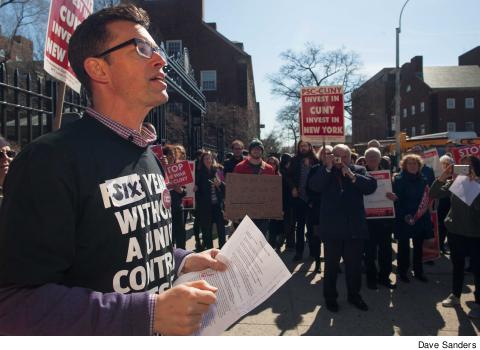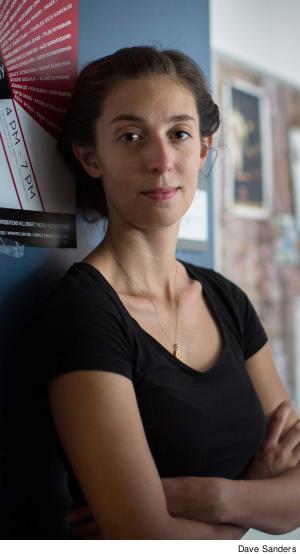Rank-and-file say campaign motivated members
 |
With a 94 percent “yes” vote on the ratification of the PSC’s contract with CUNY, it’s fair to say the vote was an overwhelming membership endorsement of the contract members struggled, advocated and, in some cases, were arrested for.
But the vote demonstrates another powerful feature the union can be proud of – an extremely high voter participation rate. Over the course of the contract campaign, the PSC held press conferences, dozens of demonstrations, a strike-authorization vote, lobbying events and two civil disobedience protests that ended in nearly 100 arrests – all of which not only put the union’s struggle front and center in the local media, but helped mobilize rank-and-file members throughout the five boroughs.
RECORD BREAKING
In a dispatch to members on August 3 following the ratification vote, PSC President Barbara Bowen said, “A record-breaking 72 percent of eligible voters participated in the contract ratification vote. The level of engagement is unprecedented in PSC ratification votes; it is a testament to our shared vision of a better university and evidence of your commitment to member-to-member organizing.”
Seventy-two percent is a large participation rate by any measure. PSC activists see their high participation as a result of active rank-and-file unionism built over the last year, but also as an indicator of what kind of momentum the union can bring to contract implementation and local campaigns.
“The high turnout rate is illustrative of the level of activism around all the campuses and the outreach members did, and the fact the leadership figured out ways to make the struggle more public meant people were seeing their own issues echoed in the news,” said Brooklyn College PSC Chapter Chair James Davis. “That amplified the issue for people who were talking about it in their offices.”
As Davis added, the record turnout means the union is more powerful moving forward.
“The whole contract struggle politicized the membership because people had to find out answers to all kinds of questions of how contracts get made and how issues within a contract become priorities. Having seen the nuts and bolts of it, on the legislative side and on the internal side, people are better educated and they see the way member-to-member organizing is a key piece to building strength and shifting the political context,” said Davis. “I’m hoping we can build off that self-education.”
 |
Anne Posten, an adjunct lecturer in English at Queens College, said that the impressive participation numbers were the result of “the work that was done all year organizing” that resulted in “a higher understanding of the union’s presence” on campus.
Looking toward the future, Posten said that this energy would help to build bridges between full-time faculty and adjuncts, saying, “What I hope is that the ratification and the implementation will build the understanding of what we have achieved together and can continue to build together.”
For Luke Elliott-Negri, the Graduate Center’s PSC chapter chair, the campaign for a just contract reengaged the rank-and-file and allowed for new organizing, including the creation of a new local shop steward and grievance handling system at the Graduate Center. “We had more engagement,” he said. “It’s forced us to do a lot of internal organizing. This is a reflection of that work, that there’s a higher level of cognizance of what the union is.”
Murphy Institute-based Higher Education Assistant Sarah Hughes noted that the strike authorization vote inspired many members to take on a back-to-basics model of individual shop organizing. “The strike authorization was really great practice, making us pair up and make lists of who to visit,” she said. “Laying that kind of groundwork of real base-building and relationship-building, that was a real exciting part,” Hughes said.
RAISING THE STAKES
Hughes, who was arrested during a civil disobedience action outside the governor’s Manhattan office on March 24, said that such a high-profile action against Governor Andrew Cuomo inspired PSC members to get more involved with the contract campaign. It successfully painted the governor as a target who had raised the stakes of the campaign.
Looking forward, she hopes that the high participation in the contract vote translates into more internal organizing over the next year. “We immediately want do new member orientations and training around the next contract campaign,” she said, noting that there are citywide elections next year and gubernatorial election a year after that.

